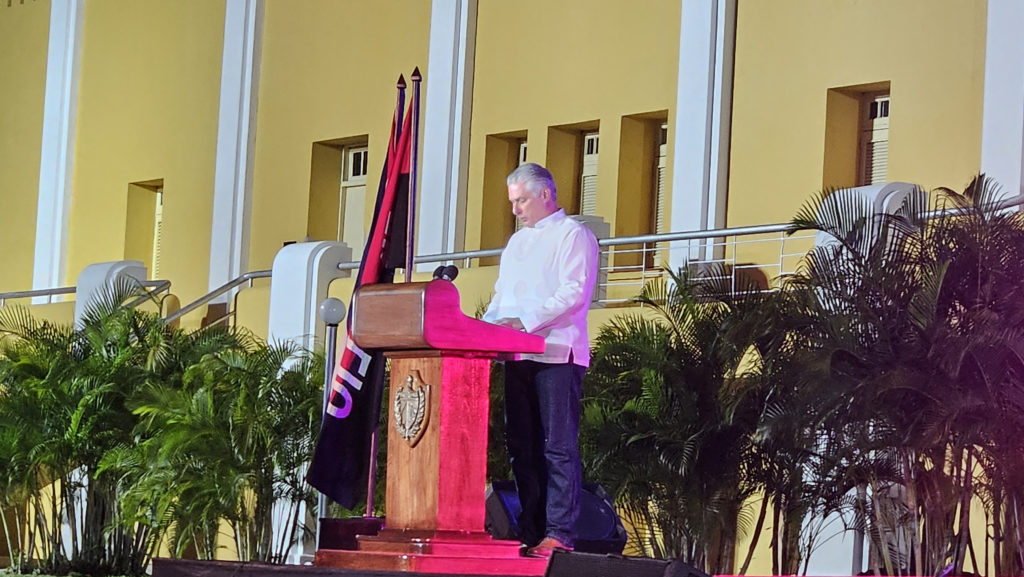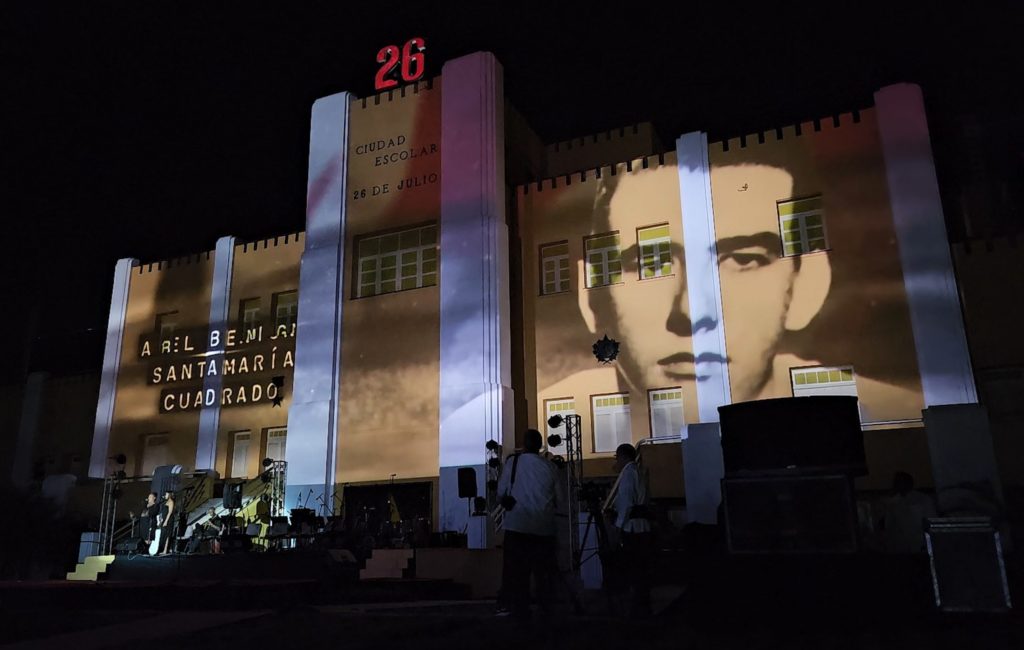Santiago de Cuba
At 5:12 a.m., July 26, 1953, 100 men and two women under the leadership of Fidel Castro attacked with arms the Moncada military barracks in Santiago de Cuba. The purpose? To initiate the revolutionary battle against dictator Fulgencio Batista, attain weapons from the defeated soldiers and go into the mountains to continue the struggle until victory. The plan was the same at the Carlos Manuel de Céspedes barracks at Bayamo, 80 miles away.
But the Moncada assault failed. Within hours a bloody massacre by Batista’s army ensued. Only six rebels died in combat; 55 men were captured, tortured and slaughtered.
Yet, the Moncada assault became the clarion call to the Cuban people as they learned of the bold and courageous challenge to Batista. Five years and five months later, Fidel’s July 26th Movement succeeded in overthrowing U.S. puppet Batista. Thus began the struggle for national liberation and Cuba’s socialist construction. Today, July 26th is a major holiday in Cuba.
At pre-dawn on July 26, 10,000 Cubans entered the hallowed grounds of the Moncada — now a school — to commemorate the 70th anniversary of the Moncada assault. Accompanying them were some 269 visitors of international brigades from 26 states, the U.S., Puerto Rico, Venezuela, Germany, Belgium, Chile, Canada and other Caribbean nations. From the United States, were the IFCO/Pastors for Peace caravanistas and a leadership group of the Venceremos Brigade. Activists of the Cuba and Venezuela Solidarity Committee also participated. At the solidarity march of the international activists the day before, Puerto Rico led as the principal delegation, marking 125 years of U.S. colonialism and the struggle for independence.
Receiving a standing ovation at the historic commemoration were President Miguel Díaz-Canel, two leading combatants of the Moncada assault, historic leader of the Revolution and General of the Army Raúl Castro and Ramiro Valdez Menéndez, who became a commander of the guerrilla war.

A stunning cultural/political performance and reenactment of July 26, 1953, preceded the president’s talk, featuring a dramatic projection onto the walls of the Moncada façade. It began with performers dancing to represent Carnaval celebrations in Santiago that fateful night. Fidel Castro picked the traditional festival to begin the armed action. He figured that the soldiers would be distracted or sleeping.
Depicting key events of the Moncada assault and subsequent events, dramatic high-tech digital scenes were projected on the Moncada façade. The image and name of each martyr was projected, accompanied by stirring music of two women singers.

To address the multitude, President Díaz-Canel rose to the stage to a standing ovation. He spoke of the selfless sacrifice of the combatants and the heroes who survived to continue the struggle.
Bringing that historic date to the present, Díaz-Canel said, “But since 1959 we are much more than a few dozen brave young people against Batista’s tyranny. Since 1959 we are a people that defends the revolution and socialism as the most just road to achieve the most just society for all.
“Cuba has had to face the imperial ambitions of its powerful neighbor for more than 200 years, with various forms and methods by seduction or with aggression by the carrot or the stick.
“Its obsession with possessing us has not ceased. It is a conduct dictated by the very nature of imperialism, the natural enemy of the peoples’ right to self-determination and of any government that proposes to truly develop a program of social justice. …
“They have shown themselves to be more aggressive and more intolerant when realizing that there is no force in the world capable of making us renounce those Marxist ideals, but also the ideals of Martí and Fidel, that inspire the tireless struggle for the greatest possible social justice.
“This explains the severity of the economic blockade and the current reinforcement measures established by the Donald Trump government and maintained by the Biden government, whose effect has increased the policy of economic coercion that has escalated the blockade to a qualitatively more aggressive and harmful dimension.”
Díaz-Canel listed five main components of the U.S. economic war:
- The spurious list of states that the U.S. unilaterally has declared as state sponsors of terrorism. This decree has severely restricted Cuba’s ability to use international banks for commerce, trade and imports.
- Title 3 of the Helms-Burton Law, which allows U.S. entities to sue any international business in the world that invests in Cuba. This has severely hampered investments.
- Blocking the import of petroleum that is needed for the country’s energy needs.
- Demonization and persecution of Cuba’s internationalist medical missions, forcing countries to expel Cuban doctors who provide essential care to hundreds of thousands in the world for free, and in countries with higher economic development, the Cuban professional services provide important income for Cuba’s internal health system.
- The existence of a U.S. list that greatly restricts the U.S. people’s right to travel to Cuba, by banning patronage in almost all hotels on the island, even to the ridiculous extent of prohibiting U.S. people from the beaches.
The international visitors issued resolutions of commitment to intensify the fight against the U.S. blockade and the false SSOT designation.
Díaz-Canel recognized the great difficulties that the whole Cuban people are facing with the economic war that the U.S. imposes. But he also honored the continued heroism of Cubans who are determined to defend their Revolution:
“Good Cubans, patriots, compatriots, men and women from Santiago:
“Let us ratify here, before those assailants of the Moncada garrison 70 years ago who accompany us still, and on the land that holds the blood or ashes of those who are no longer here, to preserve and protect the memory of those who gave their lives so that we would finally be free, in that selfless act that still moves us.
“Since July 26, 1953, the best of each generation has faced the challenges and difficulties that the times impose on us, with the spirit that was revealed in Moncada, Fidel’s idea that will never leave us: The setback can be turned into victory! …
“Thank you Santiago!
“Long live the Cuban Revolution!
“Homeland or Death, We Will Win!”






